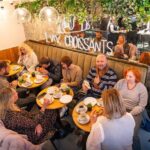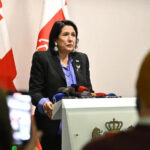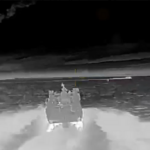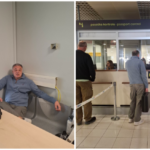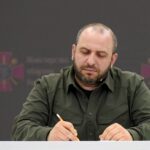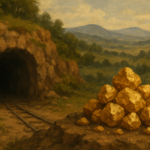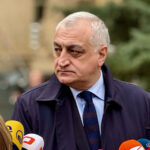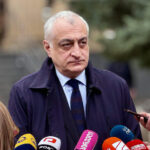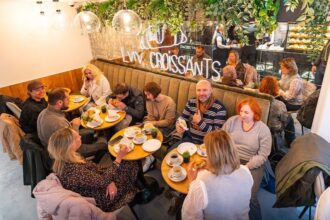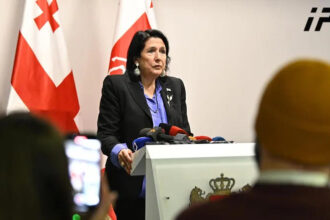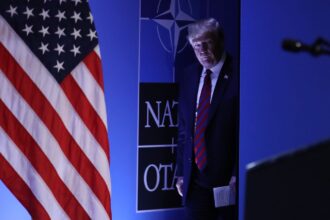Over the past year, London’s Palestinian and Israeli community has been dealing with the aftermath of a conflict that is thousands of miles away but all too close.
On 7 October 2023, Hamas operatives in Gaza invaded Israel and killed more than 1,000 Israelis. They also took around 250 hostages.
Israel responded by bombing Gaza and killing at least 41,000 Palestinians.
As the conflict escalates in the Middle East, two Londoners, one Israeli and one Palestinian, shared their grief, trauma, and thoughts about the future with me, one year later.
Magen Inon is a 41-year-old lecturer who lives in London, England, with his family.
His parents were murdered on 7 October in their home, a smallholding near the border of Gaza in Israel.
“My parents sent me a message stating that they could hear gunshots and were in the safe room. This was the last message they sent us.”
The home of his parents was destroyed by fire.
The death of his father was confirmed shortly after, but not that of his mother.
“We didn’t receive confirmation of my mother’s death until August.” It took months.
“My mum was supposed to be the last person missing from the 7th of October.
Published on 5 April
Published on 1 October
Published on 24 August
Since then, he has spent his time trying continue what he believes to be his parents’ legacy – to stop the war and to call for the release of the hostages. He also calls for humanitarian aid in Gaza.
“My parents raised us in a home that was always open to all.” It didn’t really matter what their group identity was, their religion or their mother tongue… for us, it was just natural.
In the immediate aftermath of the 7 October, he and his siblings felt that some people “were trying to hijack our pain to call for revenge and to call for continual violence”.
“It was important to us that we raise a different tone.”
He has held talks with Palestinians who share his views at universities, where possible. He has called for a ceasefire and a halt to the war, as well as humanitarian aid to Gaza.
Ahmed Alnaouq is a journalist who grew up in Gaza and moved to the UK five years ago as a student.
He and his wife also live in London.
On 22 October, he lost 21 members of his family when the bombing of his home took place.
“Israel dropped a nuclear bomb on my home, killing my father, two of my brothers, three of my sisters, 14 of my nieces and nephews and my cousin.
They were in Deir Al Balah, in the southern part of the Gaza Strip. It was declared a “safe area” by Israel at the time.
Since then, he claims, he has also lost more relatives.
“I’ve lost so many family member.” I am telling you the truth, I don’t even know how many of my family members I have lost.
Ahmed is the founder of We are Not Numbers. This youth-led Palestinian project tells the stories behind numbers of Palestinians that appear in the news.
He is also the co-founder, with Israeli journalist Yuval Abraham, of Across The Wall, a writing and publishing project that began in the Gaza Strip, in Hebrew and Arabic, to help Israelis better understand what was happening behind the wall that separates Gaza from Israel.
He still believes in peace but says “right now, it seems very dark and very bleak”.
“The only light I can see at the end of this tunnel is the good people in the world who care about the Palestinians.”
Since last year, their lives have irrevocably changed.
“The problem is it doesn’t end.” It is ongoing. It is ongoing.
“I believe that we will never be able to recover from the horrors and traumas that we have experienced. Never.
“I believe that the trauma we are experiencing right now will be passed on to our children and grand-children.”
Magen says that he feels anxious whenever he meets Palestinians. However, he knows, despite the division, “we are both suffering from the same conflict”.
He said: “If we share the same values then we can move beyond that and become partners. I’ve experienced this a number of times in the last year, with a number of Palestinian partners with whom I work.
He would like to remain a peacemaker.
“Once you begin to think about ‘what kind of world do I want to create for them? What’s the future that I want for them? Instead of ‘how can I avenge the death of my loved ones?’ This is a wrong direction, I believe.
It’s much easier to find a common ground.
Ahmed says that despite the trauma of losing many family members, the past can’t be changed.
He believes that it is more important to look towards the future.
“We are all sisters and brothers in humanity. What’s going on in Gaza is a battle against humanity.
“We should all work together to stop this war, but also all other wars around the world.”
Published on 6 November 2023
Published 4 days ago
Read More @ www.bbc.com
